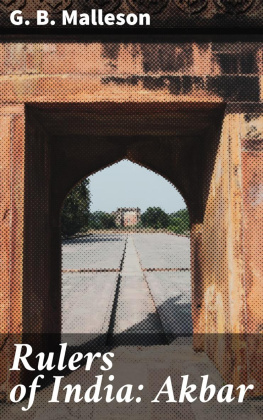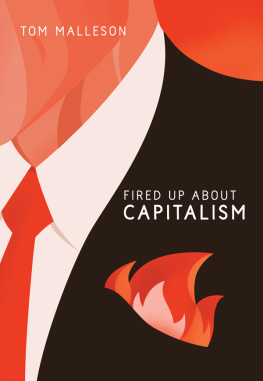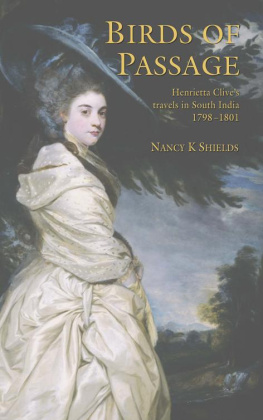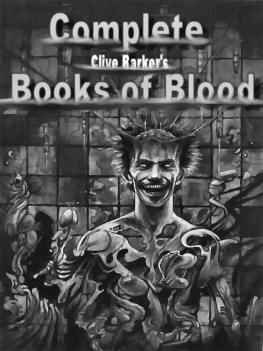PREFACE
Table of Contents
The following list represents the works of the last century which I have consulted to write this Life of Lord Clive:
Orme's History of Indostan (original edition); The Siyaru-l Muta-akherin of Ghulm Husain Khn (Review of Modern Times), translated copy; Cambridge's War in India (containing the Journal of Stringer Lawrence); The Memoir of Dupleix (in French); Grose's Voyage to the East Indies; Ive's Voyage and Historical Narrative;Transactions in India from the commencement of the French War in 1756 (published in 1786); Caraccioli's Life of Lord Clive; Vansittart's Narrative of the Transactions in Bengal; Ironside's Narrative of the Military Transactions in Bengal in 1760-1; Verelst's English Government in Bengal; some numbers of the Asiatic Annual Register; Kindersley's Letters; and Scrafton's Letters; and, for the earlier periodthat displaying the period immediately preceding and following the dawn of geniusthe recently written extracts from the Madras records by Mr. G. W. Forrest.
Of works of scarcely less value published during the present century, I have consulted the admirable volumes by Colonel Mark Wilks, which bring the History of Southern India down to the storming of Seringapatam in 1799; The Journal of Captain Dalton, one of the heroes of Trichinopoli, written at the period of Clive's early victories, but only given to the world, with a memoir of his career, in 1886; Lord Stanhope's History of England; Malcolm's Life of Clive; and above all, that mine of wealth to a searcher into the details of Clive's services in Bengal, Colonel Broome's History of the Bengal Army. Colonel Broome was my intimate and valued friend. He knew more about the history of the rise of the English in India than any man I ever met. He had made the subject a life-study. He had read every tract, however old, every letter, however difficult to decipher, every record of the period up to and beyond the time of Job Charnock, and he was a past-master of his subject. He had collected an enormous mass of materials, the more bulky of which were dispersed at his untimely death. But I have seen and handled them, and I can state most positively, from my own knowledge, that every item of importance culled from them is contained in the admirable volume to which I have referred, and which was published in 1850. There is, alas, only that volume. Colonel Broome had set apart a vast mass of materials for his second, and had resolved to complete the work at Simla, to which place he was proceeding for the summer of, I think, 1870. But, in the course of transit, the box containing the materials was mysteriously spirited away, and I have not heard that it was ever found. From the nature of the documents collected I cannot but regard the loss as irreparable.
G. B. M ALLESON .
NOTE
The orthography of proper names follows the system adopted by the Indian Government for the Imperial Gazetteer of India. That system, while adhering to the popular spelling of very well-known places, such as Punjab, Poona, Deccan, &c., employs in all other cases the vowels with the following uniform sounds:
a, as in woman: , as in father: i, as in kin: , as in intrigue: o, as in cold: u, as in bull: , as in rural.
LORD CLIVE
Table of Contents
CHAPTER I
Table of Contents
E ARLY Y EARS
Towards the close of the year 1744 there landed at Madras, as writer in the service of the East India Company, a young Englishman just entering the twentieth year of his existence, named Robert Clive.
The earlier years of the life of this young man had not been promising. Born at Styche, near Market Drayton, in Shropshire, he had been sent, when three years old, to be cared for and educated at Manchester, by a gentleman who had married his mother's sister, Mr. Bayley of Hope Hall. The reason for this arrangement, at an age so tender, is not known. One seeks for it in vain in the conduct and character of his parents; for although his father is described as irascible and violent, his mother was remarkable for her good sense and sweet temper. To her, Clive was wont to say, he owed more than to all his schools. But he could have seen but little of her in those early days, for his home was always with the Bayleys, even after the death of Mr. Bayley, and he was ever treated there with kindness and consideration. After one or two severe illnesses, which, it is said, affected his constitution in after life, the young Robert, still of tender years, was sent to Dr. Eaton's private school at Lostocke in Cheshire: thence, at eleven, he was removed to Mr. Burslem's at Market Drayton. With this gentleman he remained a few years, and was then sent to have a brief experience of a public school at Merchant Taylors'. Finally, he went to study at a private school kept by Mr. Sterling in Hertfordshire. There he remained until, in 1743, he was nominated to be a writer in the service of the East India Company.
The chief characteristics of Robert Clive at his several schools had been boldness and insubordination. He would not learn; he belonged to a 'fighting caste'; he was the leader in all the broils and escapades of schoolboy life; the terror of the masters; the spoiled darling of his schoolmates. He learned, at all events, how to lead: for he was daring even to recklessness; never lost his head; was calmest when the danger was greatest; and displayed in a hundred ways his predilection for a career of action.
It is not surprising, then, that he showed the strongest aversion to devote himself to the study which would have qualified him to follow his father's profession. A seat at an attorney's desk, and the drudgery of an attorney's life, were to him as distasteful as they proved to be, at a later period, to the eldest son of Isaac Disraeli. He would have a career which promised action. If such were not open to him in his native land, he would seek for it in other parts of the world. When, then, his father, who had some interest, and who had but small belief in his eldest son, procured for him the appointment of writer in the service of the East India Company, Robert Clive accepted it with avidity.
Probably if he had had the smallest idea of the nature of the duties which were associated with that office, he would have refused it with scorn. He panted, I have said, for a life of action: he accepted a career which was drudgery under a tropical sun, in its most uninteresting form. The Company in whose service he entered was simply a trading corporation. Its territory in India consisted of but a few square miles round the factories its agents had established, and for which they paid an annual rental to the native governments. They had but a small force, composed principally of the children of the soil, insufficiently armed, whose chief duties were escort duties and the manning of the ill-constructed forts which protected the Company's warehouses. The idea of aggressive warfare had never entered the heads even of the boldest of the English agents. They recognized the native ruler of the province in which lay their factories as their overlord, and they were content to hold their lands from him on the condition of protection on his part, and of good behaviour and punctual payment of rent on their own. For the combative energies of a young man such as Robert Clive there was absolutely no field on Indian soil. The duties devolving on a writer were the duties of a clerk; to keep accounts; to take stock; to make advances; to ship cargoes; to see that no infringement of the Company's monopoly should occur. He was poorly paid; his life was a life of dull routine; and, although after many years of toil the senior clerks were sometimes permitted to trade on their own account and thus to make large fortunes, the opportunity rarely came until after many years of continuous suffering, and then generally when the climate had exhausted the man's energies.








